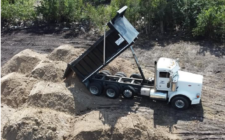Forestry operations utilize specialized commercial vehicles and equipment that work in remote woodland environments while handling enormous loads under challenging conditions that test equipment durability limits. Log trucks, chip haulers, and forest service vehicles must operate reliably on forest roads while transporting valuable timber products that require secure transport and schedule reliability. The lubrication requirements for forestry vehicles combine heavy-duty commercial performance with the additional challenges of remote operation, environmental exposure, and specialized loading systems. Castrol commercial vehicle lubricants provide the specialized protection required for reliable forestry operations.
Log transport operations create extreme demands on commercial vehicle systems through maximum legal loads, challenging forest road conditions, and specialized loading equipment that requires reliable operation throughout timber transport operations. Log trucks must maintain stability and control while navigating winding forest roads with loads that approach legal limits. Engine protection becomes critical for maintaining reliable performance while operating under continuous heavy load conditions in remote forest environments.
Forest road conditions present unique challenges for commercial vehicle operation through unpaved surfaces, steep grades, and seasonal variations that affect traction and vehicle control. Vehicles must maintain reliable operation while navigating roads that may become impassable during certain weather conditions while carrying valuable cargo that requires secure transport. Drivetrain and brake system reliability become particularly important for safe operation on challenging forest roads.
Hydraulic loading systems including log loaders, chip van positioning, and trailer stabilization require consistent operation throughout timber loading and transport operations. These specialized systems handle enormous loads while operating in dusty, contaminated forest environments that can affect hydraulic performance. Advanced hydraulic fluids with superior contamination resistance help maintain system reliability despite challenging operating conditions common in forestry applications.
Remote operation challenges forestry vehicle fleets through limited service access and extended operating periods without maintenance support that emphasize the importance of reliable vehicle performance. Forest operations often occur hundreds of kilometers from service facilities, making vehicle reliability critical for maintaining operational continuity. Extended drain intervals and predictive maintenance become essential for controlling maintenance costs while ensuring vehicle availability in remote locations.
Seasonal operation variations affect forestry vehicles through changing weather conditions, road accessibility, and harvest schedules that create varying demands on vehicle systems. Winter logging operations may require specialized cold-weather preparations, while summer operations can create thermal stress from heavy loads and demanding operating conditions. Seasonal maintenance programs help ensure optimal vehicle performance throughout varying forestry conditions.
Environmental protection requirements for forestry operations include measures to protect sensitive woodland ecosystems from contamination while maintaining operational efficiency. Many forestry operations implement environmental management programs that emphasize responsible lubricant selection and spill prevention. Biodegradable lubricants that maintain performance while reducing environmental risk help forestry operations meet environmental stewardship objectives.
Safety considerations in forestry operations emphasize reliable vehicle systems for protecting workers and equipment while operating in challenging forest environments. Vehicle breakdowns in remote locations can create safety risks while affecting operational efficiency and worker welfare. Proper lubrication helps maintain vehicle reliability while supporting safe working conditions in demanding forestry applications.
Load securement and transport regulations for timber products require reliable vehicle systems that maintain cargo security while protecting valuable forest products during transport. Specialized trailer systems and load securement equipment must operate consistently while handling varied log sizes and species. Mechanical system reliability affects both cargo security and transport efficiency in forestry operations.
Technology integration in forestry operations includes GPS tracking, load monitoring, and forest management systems that depend on reliable vehicle operation for data collection and operational coordination. These systems help optimize harvest efficiency while providing traceability for forest products throughout demanding timber operations.
Economic pressures facing forestry operations emphasize the importance of vehicle reliability for controlling operational costs while maintaining competitive timber pricing. Vehicle downtime in remote locations can significantly impact operational efficiency while increasing costs through emergency service requirements and lost productivity.
As forestry operations continue embracing sustainable practices and advanced technology, lubrication requirements will become increasingly important for maintaining the vehicle reliability required for efficient timber operations while supporting environmental stewardship and operational sustainability throughout demanding forestry applications.
For more information on forestry operations, visit the Institute of Chartered Foresters or explore resources from the Forestry Commission.




